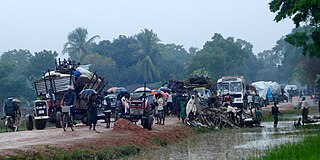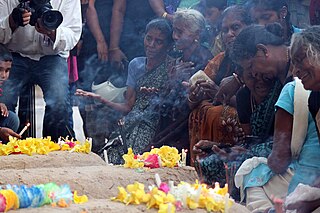Related Research Articles

The Sri Lankan civil war was a civil war fought in Sri Lanka from 1983 to 2009. Beginning on 23 July 1983, it was an intermittent insurgency against the government by the Liberation Tigers of Tamil Eelam led by Velupillai Prabhakaran. The LTTE fought to create an independent Tamil state called Tamil Eelam in the north-east of the island, due to the continuous discrimination and violent persecution against Sri Lankan Tamils by the Sinhalese-dominated Sri Lanka government.

The Janatha Vimukthi Peramuna is a leftist political party in Sri Lanka. The party was formerly a revolutionary movement and was involved in two armed uprisings against the government of Sri Lanka: once in 1971 (SLFP), and another in 1987–1989 (UNP). The motive for both uprisings was to establish a socialist state. Since then the JVP has entered mainstream democratic politics and has updated its ideology, abandoning some of its original Marxist policies such as the abolition of private property. The JVP has been led by President Anura Kumara Dissanayake since 2014.
Human rights in Sri Lanka provides for fundamental rights in the country. The Sri Lanka Constitution states that every person is entitled to freedom of thought, conscience and religion, including the freedom to have or to adopt a religion or belief of his choice. And, that every person is equal before the law.

TamilNet is an online newspaper that provides news and feature articles on current affairs in Sri Lanka, specifically related to the erstwhile Sri Lankan Civil War. The website was formed by members of the Sri Lankan Tamil community residing in the United States and publishes articles in English, German and French.
The Kent and Dollar Farm massacres were the first massacres of Sinhalese civilians carried out by the LTTE during the Sri Lankan Civil War. The massacres took place on 30 November 1984, in two tiny farming villages in the Mullaitivu district in north-eastern Sri Lanka. The Sri Lankan government labeled this as an attack on civilians by the LTTE.

Eelam War II is the name given to the second phase of armed conflict between Sri Lankan military and the separatist Liberation Tigers of Tamil Eelam. The war started after the failure of peace talks between the Premadasa government and the LTTE. This phase of the war was initiated by the LTTE who massacred almost 600 Sinhalese and Muslim police personnel after they were ordered by the Premadasa government to surrender to the LTTE. The truce was broken on June 10, 1990, when the LTTE in October expelled all the 28,000 Muslims residing in Jaffna.

Sarathambal Saravanbavananthatkurukal or better known as Sarathambal was a minority Sri Lankan Tamil woman who was gang raped and killed on 28 December 1999. This became an internationally known incident of the Sri Lankan Civil War.
Tens of thousands of people have been disappeared in Sri Lanka since the 1980s. A 1999 study by the United Nations found that Sri Lanka had the second highest number of disappearances in the world and that 12,000 Sri Lankans had disappeared after being detained by the Sri Lankan security forces. A few years earlier the Sri Lankan government had estimated that 17,000 people had disappeared. In 2003 the Red Cross stated that it had received 20,000 complaints of disappearances during the Sri Lankan Civil War of which 9,000 had been resolved but the remaining 11,000 were still being investigated. Amnesty International reported in 2017 that the disappeared persons in Sri Lanka could be between 60,000 and 100,000 since the late 1980s.
War crimes during the final stages of the Sri Lankan civil war are war crimes and crimes against humanity which the Sri Lanka Armed Forces and the Liberation Tigers of Tamil Eelam have been accused of committing during the final months of the Sri Lankan civil war in 2009. The war crimes include attacks on civilians and civilian buildings by both sides; executions of combatants and prisoners by both sides; enforced disappearances by the Sri Lankan military and paramilitary groups backed by them; sexual violence by the Sri Lankan military; the systematic denial of food, medicine, and clean water by the government to civilians trapped in the war zone; child recruitment, hostage taking, use of military equipment in the proximity of civilians and use of forced labor by the Tamil Tigers.
The Lessons Learnt and Reconciliation Commission was a commission of inquiry appointed by Sri Lankan President Mahinda Rajapaksa in May 2010 after the 26-year-long civil war in Sri Lanka to function as a Truth and reconciliation commission. The commission was mandated to investigate the facts and circumstances which led to the failure of the ceasefire agreement made operational on 27 February 2002, the lessons that should be learnt from those events and the institutional, administrative and legislative measures which need to be taken in order to prevent any recurrence of such concerns in the future, and to promote further national unity and reconciliation among all communities. After an 18-month inquiry, the commission submitted its report to the President on 15 November 2011. The report was made public on 16 December 2011, after being tabled in the parliament.
The Report of the Secretary-General's Panel of Experts on Accountability in Sri Lanka was a 2011 report produced by a panel of experts appointed by United Nations Secretary-General (UNSG) Ban Ki-moon to advise him on the issue of accountability with regard to any alleged violations of international human rights and humanitarian law during the final stages of the Sri Lankan Civil War. The report is referred to by some as the Darusman Report, after the name of the chairman of the panel.
Reactions to the end of the Sri Lankan Civil War on 18 May 2009 were generally positive and welcoming, while some countries expressed concern over the civilian casualties and the humanitarian impact.

The 2013 Commonwealth Heads of Government Meeting was the 23rd Meeting of the Heads of Government of the Commonwealth of Nations. It was held in Colombo, Sri Lanka, from 15 to 17 November 2013. Commonwealth leaders agreed on Sri Lanka as the 2013 host for the meeting when they met in Port of Spain, Trinidad and Tobago, in 2009. Sri Lanka, which was originally slated to host the summit in 2011, was accused of committing atrocities during the Sri Lankan civil war and the summit was instead held in Perth, Australia; Colombo was given the 2013 summit instead. The leaders of Canada, Mauritius, and India boycotted the summit, citing alleged human rights violations by Sri Lanka against its Tamil minority. Protests were also banned during the summit. President Mahinda Rajapaksa summarised the summit's events as: "Issues covered in the communique include development, political values, global threats, challenges and Commonwealth cooperation." However, the meeting was overshadowed by controversy over Sri Lanka's human rights record and the alleged war crimes during the final stages of the civil war. This was the first time in 40 years that the Head of the Commonwealth, Queen Elizabeth II, was not present at the CHOGM.

The Tamil genocide refers to the various systematic acts of physical violence and cultural destruction committed against the Tamil population in Sri Lanka during the Sinhala–Tamil ethnic conflict beginning in 1956, particularly during the Sri Lankan civil war. Various commenters have accused the Sri Lankan state of responsibility for and complicity in a genocide of Tamils, and point to state-sponsored settler colonialism, state-backed pogroms, and mass killings, enforced disappearances and sexual violence by the security forces as examples of genocidal acts.
Events from the year 2014 in Sri Lanka.

Mullivaikkal Remembrance Day is a remembrance day observed by Sri Lankan Tamils to remember those who were killed during the final stages of the Sri Lankan Civil War. It is held each year on 18 May, the date on which the civil war ended in 2009, and is named after Mullivaikkal, a village on the northeastern coast of Sri Lanka which was the scene of the final battle of the civil war and the site of the Mullivaikkal massacre.
Terrorism in Sri Lanka has been a highly destructive phenomenon during the 20th and 21st centuries, especially so during the periods of the Sri Lankan Civil War (1983–2009) and the first (1971) and second JVP insurrections (1987–1989). A common definition of terrorism is the systematic or threatened use of violence to intimidate a population or government for political, religious, or ideological goals. Sri Lanka is a country that has experienced some of the worst known acts of modern terrorism, such as suicide bombings, massacres of civilians and assassination of political and social leaders. Terrorism has posed a significant threat to the society, economy and development of the country. The Prevention of Terrorism Act of 1978 is the legislation that provides the powers to law enforcement officers to deal with issues related to terrorism in Sri Lanka. It was first enacted as a temporary law in 1979 under the presidency of J. R. Jayewardene, and later made permanent in 1982.
Sexual violence against Tamils in Sri Lanka has occurred repeatedly during the island's long ethnic conflict. The first instances of rape of Tamil women by Sinhalese mobs were documented during the 1958 anti-Tamil pogrom. This continued in the 1960s with the deployment of the Sri Lankan Army in Jaffna, who were reported to have molested and occasionally raped Tamil women.
References
- 1 2 Cronin-Furman, Kate; Krystalli, Roxani (March 2021). "The things they carry: Victims' documentation of forced disappearance in Colombia and Sri Lanka". European Journal of International Relations. 27 (1): 79–101. doi:10.1177/1354066120946479. hdl: 10023/20593 . ISSN 1354-0661.
- ↑ "About Us". People for Equality and Relief in Lanka. 2021-08-06. Retrieved 2024-11-02.
- 1 2 "Tasha Manoranjan". Just Security. Retrieved 2024-11-02.
- 1 2 "Madura Rasaratnam". Al Jazeera. Retrieved 2024-11-02.
- ↑ Ravichandradeva, Archana (2022-09-18). "South Korea must advocate for Tamil rape victims of Sri Lanka's war and military occupation". The Korea Times.
- ↑ Seoighe, Rachel (2017). War, Denial and Nation-Building in Sri Lanka: After the End. Springer. p. 282. ISBN 978-3-319-56324-4.